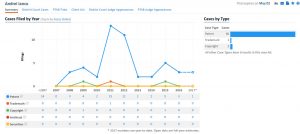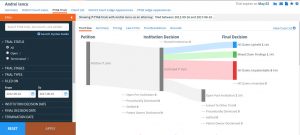
Andrei Iancu
On Friday, August 25, 2017, the Trump Administration announced several nominations, one of which was the nomination of Andrei Iancu to be the next Under Secretary of Commerce for Intellectual Property and Director of the United States Patent and Trademark Office (USPTO). Sources had expected this announcement could have come as early as the beginning of July. So why then was this announcement made on a lazy summer Friday, a time slot usually reserved for Administrations to bury controversial or damaging information? Perhaps we will never know the answer to that question, but with rumors of an Iancu nomination being a done deal for months it seems extremely unlikely that there was anything controversial found in his FBI background investigation, and it seems unlikely also that there is any reason for the Administration to expect anything other than a smooth confirmation process.
Andrei Iancu will come to the agency after most recently serving as the managing partner of Irell & Manella LLP, practicing full time with the firm’s litigation and intellectual property practice groups. According to his firm profile, Iancu’s practice with the firm focused upon intellectual property litigation, but has involved himself with all aspects of intellectual property practice, including patent and trademark prosecution, due diligence and licensing. He has represented clients in technological fields including genetic testing, the Internet, medical devices, therapeutics, telephony, TV broadcasting, video game systems and computer peripherals. In addition to his legal practice, Iancu co-teaches an advanced patent class at UCLA School of Law, where he serves as an adjunct professor.
Iancu has received recognition for his legal work since 2007, when Chambers USA first named him as a leading individual in the area of intellectual property and patent law; his bio states he has received that distinction every year since. Since 2011, Iancu has been listed by Intellectual Asset Management (IAM) as among California’s top patent litigators in its annual IAM Patent 1000 report. Similar distinctions have been proffered since at least 2010 by the Los Angeles-San Francisco Daily Journal, Managing Intellectual Property and The Best Lawyers in America. In 2016, Iancu was named Lawyer of the Year for firms with 75 to 125 attorneys by the Los Angeles Business Journal. This year, he was recognized as one of BTI’s Client Service All-Stars for exemplary client service by corporate counsel at large organizations.
One of Iancu’s major successes during his practice as an intellectual property litigator was his work in securing large settlements for American tech company TiVo Corporation (NASDAQ:TIVO) in 2012. That year, TiVo secured a $250 million settlement from NYC-based telecommunications giant Verizon (NYSE:VZ). Months before that settlement, Dallas-based telecom firm AT&T (NYSE:T) agreed to a $215 settlement to end litigation surrounding digital video recording technology. Iancu’s bio states that total payments to TiVo from these settlements and others from Microsoft (NASDAQ:MSFT), Cisco (NASDAQ:CSCO) and others exceeds $1.6 billion.
The fact that Iancu represented TiVo, a patent owner, against big tech in Silicon Valley will undoubtedly lead to a warm reception in certain patent owner segments of the patent community. Iancu and his firm have a reputation for suing big tech while representing patent owners, and he himself also served as counsel for San Jose-based touch feedback tech firm Immersion Corporation in a patent infringement suit against Japanese tech conglomerate Sony Corporation (NYSE:SNE) involving video game controller patents which ended up netting $150 million for Immersion in March 2007.
On the other side of the coin, Iancu’s work in the biotechnology sector will undoubtedly lead to a cold, if not hostile reception. Iancu represented Ariosa Diagnostics in patent litigation against Sequenom, the patent owner. The discovery at the heart of the innovation patented by Sequenom resulted in a test for detecting fetal genetic conditions in early pregnancy that avoided dangerous, invasive techniques that are potentially harmful to both the mother and the fetus. The invention, which became embodied in U.S. Patent No. 6,258,540, claimed certain methods of using cffDNA. The patent taught technicians to take a maternal blood sample, keep the non-cellular portion (which was “previously discarded as medical waste”), amplify the genetic material that only they had discovered was present, and identify paternally inherited sequences as a means of distinguishing fetal and maternal DNA. The claimed method does not preempt other demonstrated uses of cffDNA. The Federal Circuit concluded that the discovery was “a significant contribution to the medical field,” but that did not matter insofar are patent eligibility was concerned.
The Sequenom decision was an enormous step backwards for many biotechnology companies, particularly startups. It is extraordinarily unlikely that biotechnology startups will support Iancu. Iancu may even find himself challenged during his confirmation process by biotechnology companies, as well as the Biotechnology Innovation Organization (BIO). The extent of any opposition to Iancu by the biotechnology industry is not yet known at this hour.
 According to data which we’ve collected through Lex Machina, Iancu has served as an attorney in 63 intellectual property cases at U.S. district courts, 60 of which were patent infringement cases. Iancu was most active as patent counsel in 2011 and 2012. Despite the aforementioned notable wins Iancu helped to secure on behalf of patent owners asserting their patents, Iancu
According to data which we’ve collected through Lex Machina, Iancu has served as an attorney in 63 intellectual property cases at U.S. district courts, 60 of which were patent infringement cases. Iancu was most active as patent counsel in 2011 and 2012. Despite the aforementioned notable wins Iancu helped to secure on behalf of patent owners asserting their patents, Iancu  actually has more experience as defense counsel, representing plaintiffs in 18 cases and defendants in 40 cases. Iancu has actually served as an attorney in seven trials at the Patent Trial and Appeal Board, representing either petitioners and patent owners in those cases.
actually has more experience as defense counsel, representing plaintiffs in 18 cases and defendants in 40 cases. Iancu has actually served as an attorney in seven trials at the Patent Trial and Appeal Board, representing either petitioners and patent owners in those cases.
Iancu was appointed to the managing partner position at Irell & Manella in 2012 and since that time the firm has been notable for achieving high levels of revenue per lawyer. During the 2015 fiscal year, the firm’s revenue per lawyer reached $1.59 million. In an interview on the subject with Forbes, Iancu credited the intense lawyer training at Irell & Manella including handing over responsibility and autonomy to recent hires early in their tenure at the firm. Although many firms with lower revenue per lawyer numbers were very excellent firms to Iancu, he did speak to ways that firms could improve those numbers if they so desired:
“I would begin with focusing the practice on areas where you know that you can deliver consistent excellence. You don’t have to be everything to everybody. And from there, there’s really no shortcut. You have to do what I mentioned in your first question, which is to bring in the highest quality lawyers and then set them free to grow their practices and trust that they will. And in general, they will.” – Andrei Iancu, Forbes interview dated 3/29/17
Along with being a managing partner of a law firm with an intellectual property focus, Iancu has also appeared as an author on several papers regarding the patentability of software claims, a subject of much debate over the past two decades. In February 2008, the Journal of the Patent and Trademark Office Society published a paper co-authored by Iancu titled “Code on Disks and Hat Tricks – Is Computer Software on a Medium Really Patentable?” The paper notes that software has been “the black sheep of the patent family” even as it “plays a major part in the modern world and our present economy.” Looking at Supreme Court precedent as well as recent case law, the paper concluded that Beauregard claims could meet patentability requirements under Section 101 even if many claims might not meet novelty or obviousness requirements under other statutes.
Iancu is also listed as the lead author of an article published in the Spring 2010 issue of the Northwestern Journal of Technology and Intellectual Property under the title “Machines and Transformations: The Past, Present, and Future Patentability of Software”. The paper looked at the the effectiveness of the machine-or-transformation test to determine patent-eligible subject matter in light of oral arguments made before the Supreme Court in Bilski v. Kappos; the case would be decided months later.
“Unfortunately, the test may well be throwing out the baby with the bathwater. Whatever the merits of various arguments regarding the patentability of business methods, the patentability of software processes, which are at the heart of innovation in our Information Age, at least deserves separate consideration.”
Iancu will also bring the perspective of a former engineer to the USPTO, having worked with Hughes Aircraft Company prior to joining law school. During his time with that company Iancu received several awards, including the Malcolm R. Currie Innovation Award. Iancu earned his bachelor’s degree in 1989 in aerospace engineering from UCLA. He received his master’s degree in mechanical engineering from UCLA in 1990 and graduated from the UCLA School of Law with his J.D. in 1996. While at UCLA School of Law, Iancu was a member of the Order of the Coif and received the Melville B. Nimmer Copyright Award.

![[IPWatchdog Logo]](https://ipwatchdog.com/wp-content/themes/IPWatchdog%20-%202023/assets/images/temp/logo-small@2x.png)

![[[Advertisement]]](https://ipwatchdog.com/wp-content/uploads/2023/01/2021-Patent-Practice-on-Demand-1.png)
![[Advertisement]](https://ipwatchdog.com/wp-content/uploads/2024/04/Patent-Litigation-Masters-2024-sidebar-early-bird-ends-Apr-21-last-chance-700x500-1.jpg)

![[Advertisement]](https://ipwatchdog.com/wp-content/uploads/2021/12/WEBINAR-336-x-280-px.png)
![[Advertisement]](https://ipwatchdog.com/wp-content/uploads/2021/12/2021-Patent-Practice-on-Demand-recorded-Feb-2021-336-x-280.jpg)
![[Advertisement]](https://ipwatchdog.com/wp-content/uploads/2021/12/Ad-4-The-Invent-Patent-System™.png)







Join the Discussion
14 comments so far.
Scott Bechtel
December 8, 2017 09:55 amNot what a candidate says, but what he does that matters.
patent attorney
September 1, 2017 01:06 pmThe BEST solution to 101 issues is to let them use it and/or address it ONLY after all prior art hurdles have been cleared.
Actually, the best solution would be to fix the law back to the way it was when it made sense, but the Supreme Court doesn’t seem to have any intention of allowing the statute to control anymore.
patent attorney
September 1, 2017 01:04 pmOne of the head trainers for new examiners actually told me the other day that they don’t include 101 rejections in quality metrics for new examiners who have signature authority because it’s too complicated, they don’t really get it yet, and they need to focus on 102/103. But they’re still allowed to use it……….. Well, I think I found the problem fellas. You’re letting them use a nuke without telling them what it is? That’s some serious .gov work right there.
Jeff Lindsay
August 29, 2017 03:10 amI hope he will consider imposing basic standards of ethics for PTAB judges. I also hope he will not stack the deck to influence PTAB decisions by expanding panels with judges who will give him what he wants. How sad that hoping for such basic things in this vital office is hoping for dramatic change.
Eric Berend
August 28, 2017 02:38 pm“At least not a Google sycophant”: is a sad standard, suitable for a maladroitly manipulated domain.
However, I see that Mr. Lancu does have relevant experience on ‘both sides’ in legal contention, even to the extent of PTAB practice.
It does seem that, at the least, he is not a captive interest representative masquerading as a responsible U.S. government official.
While I would think that most genuine inventors are now, past allowing any semblance of hope towards a restoration of balance in current prosecutions of the implied “I/8/8” Constitutional patent bargain; however, this man’s credentials do not read as a purely IP pirate (e.g., ‘efficient infringer’) friendly agent.
After Alice
August 27, 2017 05:05 pm“Iancu credited the intense lawyer training at Irell & Manella including handing over responsibility and autonomy to recent hires early in their tenure at the firm.”
While this exact comment isn’t applicable to Examiners, I do like the general idea.
The PTO has had significant issues in training Examiners after Alice. The current solution appears to be directed toward gathering stakeholder input and updating training accordingly. While this is a good idea, it is not by itself sufficient.
The most senior and knowledgeable Examiners that train other Examiners have no way to provide meaningful input to management. Nor are they allowed to participate in the creation of any new type of training materials, even though they have direct insight on the issues art units and workgroups are facing.
It’s not uncommon for Examiners to wait months for guidance on court cases that are extremely relevant to their technology. Some guidance never comes.
The infrequent 1-hour module training in combination with the limited amount of other-time allowed for training in an art unit and/or workgroup has not, and never will be, sufficient for training large amounts of Examiners on complex legal issues.
Moreover, while I understand the need for centralized training, a short memo issued to almost 10,000 Examiners that examine significantly different technologies does not seem to be the best way to provide training.
Considering that Examiners are essentially learning 101 on thier own and using their own production time, it is not surprising that large numbers of Examiners still struggle with properly issuing a 101 Alice-type rejection. And it doesn’t help that some managers and reviewers also don’t understand 101 in light of Alice.
After Alice, the PTO followed their standard procedure for training. However, Alice does not lend itself to the old way of doing things.
With all of the issues given above, in combination with the production requirements, I don’t see any solutions in the near future to the significant problems the PTO is facing after Alice.
However, I am hopeful Iancu’s outside-the-box thinking will change what obviously is not working at the PTO.
A good start would be for the PTO to identify the best Examiners in each technology, and work closely with them to create and provide training on McRO, Bascom, Enfish, etc. with examples that are technology specific.
Paul Morinville
August 27, 2017 01:50 pmI’d like to know if he thinks a patent is a property right or an entitlement.
Night Writer
August 27, 2017 01:32 pm@4 John Fetter: that is a very good point.
Has the feel of someone that can get big things done–not a Lee.
David Fligor
August 27, 2017 01:23 pmI worked with Andrei for many years, and I can tell you he is a fantastic choice to lead the USPTO. Regardless of political leanings, we should all support his nomination.
Bemused
August 27, 2017 10:55 amAlthough I would have preferred Phil Johnson or Randall Rader for this position, I’m cautiously optimistic that Mr. Iancu will be a more pragmatic and even-handed director of the USPTO than some of his predecessors (e.g. Lee, Dudas).
I also believe that his real-world trial court and PTAB experiences will lead him to swing the pendulum back to the center. Of course, SCOTUS could help lighten Mr. Iancu’s administrative load by reaching the correct decision in Oil States…
John Fetter
August 27, 2017 10:15 amThis man has shown repeatedly that he knows how to, and actually gets the job that he has been tasked to do, done properly.
Mark Nowotarski
August 27, 2017 05:53 amLooks like a good choice
Tesia Thomas
August 26, 2017 02:52 pmThis is a nice step in the right direction, maybe.
At least it’s not a Google appointee.
Steve
August 26, 2017 02:47 pmGene, thanks…the more info you have on his background of defending patent owners against patent infringement would be welcome. Helpful, although I doubt the biotech industry will be happy